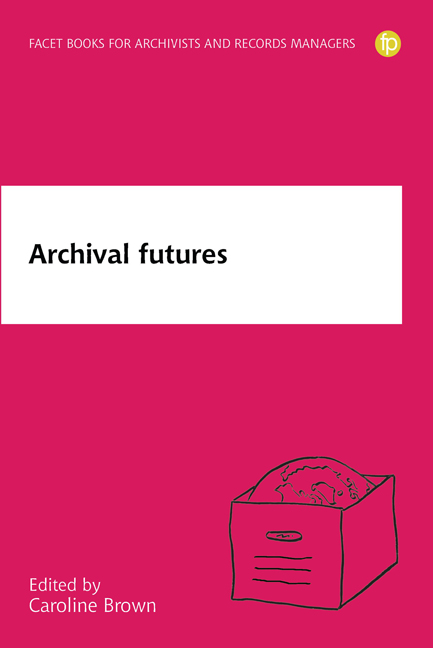Book contents
- Frontmatter
- Dedication
- Contents
- Notes on contributors
- Introduction
- 1 It's the end of the archival profession as we know it, and I feel fine
- 2 Whose truth? Records and archives as evidence in the era of post-truth and disinformation
- 3 The future of archives as networked, decentralised, autonomous and global
- 4 Can we keep everything? The future of appraisal in a world of digital profusion
- 5 Frames and the future of archival processing
- 6 Access technologies for the disruptive digital archive
- 7 Multiple rights in records: the role of recordkeeping informatics
- 8 The accidental archive
- 9 The end of archival ideas?
- Index
1 - It's the end of the archival profession as we know it, and I feel fine
Published online by Cambridge University Press: 01 June 2019
- Frontmatter
- Dedication
- Contents
- Notes on contributors
- Introduction
- 1 It's the end of the archival profession as we know it, and I feel fine
- 2 Whose truth? Records and archives as evidence in the era of post-truth and disinformation
- 3 The future of archives as networked, decentralised, autonomous and global
- 4 Can we keep everything? The future of appraisal in a world of digital profusion
- 5 Frames and the future of archival processing
- 6 Access technologies for the disruptive digital archive
- 7 Multiple rights in records: the role of recordkeeping informatics
- 8 The accidental archive
- 9 The end of archival ideas?
- Index
Summary
Introduction
When I was approached to provide a plenary address for the Association of Canadian Archivists’ meeting in Montreal, I started out with a vague idea about exploring how technology is contributing to trends in innovation in archives. As a natural result, I've been trying to learn more about how technology and the internet are affecting other professions. I kept thinking that someone must be writing about this and lo and behold I found a book: The Future of Professions: how technology will transform the work of human experts by British father and son, Richard and Daniel Susskind. Published in 2016, it was exactly the book I was looking for, and it has changed my own thinking about the future of archives, as well as the main thrust of the talk I was to give. It gave me greater insight into trends I had already observed, what drives innovation and where the roots of the next phase of innovation lie for our profession. It provided evidence for my anecdotal observations and gut feelings, surfaced new ideas and challenged some old ones. It proved to be a great inspiration when writing the talk that provides the basis for this chapter.
My observations here draw heavily from the Susskinds’ book, but primarily in form of a remix, slicing and dicing their observations and pulling the ones that best illustrate how their argument applies to the archival profession and how it relates to what we're doing today and will be doing tomorrow. In a nutshell, the Susskinds argue that we are currently in the transitional phase between ‘a print-based industrial society’ and a ‘technology-based Internet society’ (Susskind and Susskind, 2016, 151). We can see around us indications of what that technology-based internet society will be like. When it fully arrives, it will be, they claim, radically different and will bring about the end of the professions as we know them today. The professions they focus on in the book are primarily law, medicine, accounting and the like, but their analysis seems applicable to archivists as well. In this chapter I will begin by summarising some of their observations about how the way we work has changed and will change, review some of the current trends they identify, put them in an archival context and address how they can contribute to our own innovation.
- Type
- Chapter
- Information
- Archival Futures , pp. 1 - 18Publisher: FacetPrint publication year: 2018
- 1
- Cited by

